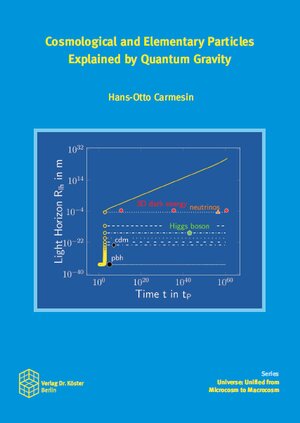Cosmological and Elementary Particles Explained by Quantum Gravity
von Hans-Otto CarmesinThe universe ranges from huge galaxies near the light horizon at a distance of 4.1 ∙ 1026 m, via elementary particles at a hierarchy of scales, towards smallest objects at the Planck scale at lengths of 1.6 ∙ 10-35 m. How did these very different objects form and develop? We present an answer by deriving a physically founded and critically tested unified theory of cosmological and elementary particles.
Details: Based on quantum gravity, I derived a series of novel results about cosmology, general relativity and particle physics. Here we extend these findings in an essential manner:
Details: Based on quantum gravity, I derived a series of novel results about cosmology, general relativity and particle physics. Here we extend these findings in an essential manner:








